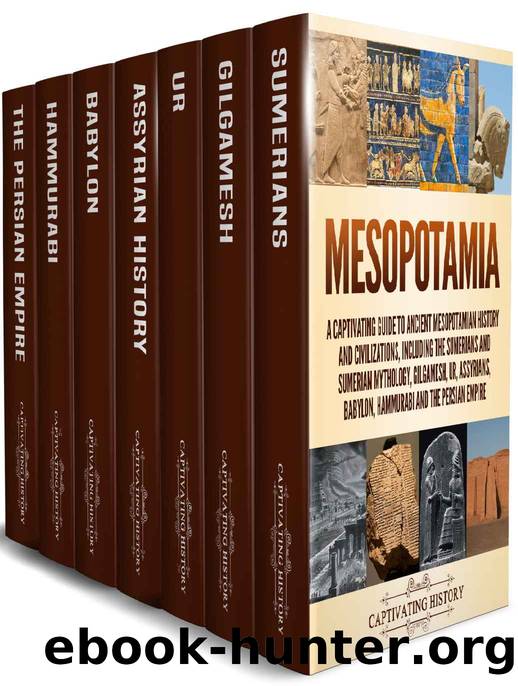Mesopotamia: A Captivating Guide to Ancient Mesopotamian History and Civilizations, Including the Sumerians and Sumerian Mythology, Gilgamesh, Ur, Assyrians, Babylon, Hammurabi and the Persian Empire by Captivating History

Author:Captivating History [History, Captivating]
Language: eng
Format: azw3
Published: 2019-01-14T00:00:00+00:00
Chapter 8 â Life in the Assyrian Empire
While Assyrian history is largely understood through the military and imperial conquests of its many kings, not everyone who lived under the Assyrians was concerned with imperial conquest. In fact, itâs likely that only a small percentage of the people who would be considered Assyrians were in fact soldiers of what would become some of the greatest armies in the history of the ancient world.
The Assyrian Lower Classes
Unsurprisingly, in the part of the world known as the âcradle of civilization,â a location credited as one of the first places where people practiced sedentary lifestyles based on agriculture, the vast majority of Assyrians, and those who would fall under Assyrian rule, were farmers.
Generally speaking, as was the case throughout most of the ancient world, the people of Mesopotamia and beyond practiced a form of feudalism. Landlords would grant people the opportunity to work their land, which they could use for their own sustenance, and in exchange, the tenants were required to produce a certain bounty for the landlord. In some cases, there is evidence of land being split between landlords and tenants, with each party receiving half of whatever production came from the land.
Part of the reason war and conquest was so important in these times was to help people maintain control of their land. Taxes were paid to local governors, and in exchange, these governors, who were under varying degrees of control to other lords, would offer protection to the farmers. If raiding tribes made their way onto a farmerâs land, the farmer would then turn to his lord to help him. The many insurrections that occurred during this period were usually in response to leadersâ inability to defend people from the constant threats posed by people migrating throughout the land.
As discussed earlier, one of the downfalls of the Assyrian Empire was its inability to properly secure conquered territories. Consider the situation of an ancient Mesopotamian farmer: an Assyrian king marches through your territory demanding you declare fealty to him in the form of taxes and tribute or suffer the consequences. You, as a helpless farmer, have no choice but to submit. However, within a year, the Assyrian army has gone, and there are people making their way onto your territory. You appeal to your Assyrian vassals, but they are far away engaging in wars of conquests in territories of which you know nothing. If another powerful king were to come and offer you protection in exchange for loyalty, what would you do? Most likely you would abandon the Assyrians in favor of this new kingâthat is until he left, and you were once again faced with the danger of invading tribes.
One can imagine that the life of a typical citizen in the Assyrian Empire was relatively unaffected by which individual was ruling.. Their only real concern was protection, meaning that they could easily be swayed to give their support to any king that was willing and able to offer this security. However, this would change as one kingdom grew more powerful.
Download
This site does not store any files on its server. We only index and link to content provided by other sites. Please contact the content providers to delete copyright contents if any and email us, we'll remove relevant links or contents immediately.
| Africa | Americas |
| Arctic & Antarctica | Asia |
| Australia & Oceania | Europe |
| Middle East | Russia |
| United States | World |
| Ancient Civilizations | Military |
| Historical Study & Educational Resources |
The Daily Stoic by Holiday Ryan & Hanselman Stephen(2708)
The Fate of Rome: Climate, Disease, and the End of an Empire (The Princeton History of the Ancient World) by Kyle Harper(2436)
People of the Earth: An Introduction to World Prehistory by Dr. Brian Fagan & Nadia Durrani(2346)
Ancient Worlds by Michael Scott(2102)
Babylon's Ark by Lawrence Anthony(2070)
Foreign Devils on the Silk Road: The Search for the Lost Treasures of Central Asia by Peter Hopkirk(2056)
India's Ancient Past by R.S. Sharma(1986)
MOSES THE EGYPTIAN by Jan Assmann(1971)
The Complete Dead Sea Scrolls in English (7th Edition) (Penguin Classics) by Geza Vermes(1840)
Lost Technologies of Ancient Egypt by Christopher Dunn(1797)
The Daily Stoic by Ryan Holiday & Stephen Hanselman(1768)
The Earth Chronicles Handbook by Zecharia Sitchin(1744)
24 Hours in Ancient Rome by Philip Matyszak(1676)
Alexander the Great by Philip Freeman(1646)
Aztec by Gary Jennings(1545)
The Nine Waves of Creation by Carl Johan Calleman(1520)
Curse Tablets and Binding Spells from the Ancient World by Gager John G.;(1510)
Before Atlantis by Frank Joseph(1483)
Earthmare: The Lost Book of Wars by Cergat(1466)
